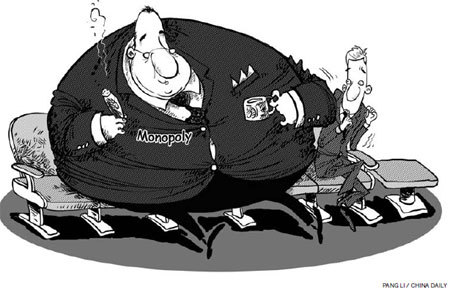Nipping monopoly activities in the bud
Updated: 2013-01-10 07:15
By Mei Xinyu (China Daily)
|
||||||||

The penal action against Samsung and LG, and four Taiwan companies, earlier this month for manipulating the prices of LCD panels on the Chinese mainland sent another signal to multinational companies to abide by China's Anti-Monopoly Law.
Slapping fines on the companies for price-fixing on the mainland is in line with the extraterritorial jurisdiction of the Anti-Monopoly Law, which is an international practice.
Many countries and regions have included mergers and acquisitions (M&As) between "real" overseas-funded enterprises that have their headquarters abroad in the list of antitrust review.
The Anti-Monopoly Law states that the law will apply to enterprises' conducts outside the People's Republic of China if they have restrictive effects on or eliminate competition in the domestic market of the PRC. In other words, the extraterritorial jurisdiction system of the law also pursues the principle of effect, though it is not explicitly stated.
China, as the world's largest home appliance producing country, largest exporter of home appliances and largest home appliance sales market, is also the biggest victim of price-fixing by Samsung, LG and other companies. Thus the penalties imposed on the companies are more than justified.
Overseas companies that want to expand their operations on the mainland should understand that their actions, even if taken outside China, fall within the purview of Chinese economic laws if they have a large enough impact on the Chinese market.
Today, China can use the extraterritorial jurisdiction of the Anti-Monopoly Law because it is the world's second largest economy and the second largest importing country. And the huge potential of the Chinese market means that no company can afford to lose.
The extraterritorial jurisdiction system of the Anti-Monopoly Law applies not only to price manipulation, but also to concentration of business operators, that is, M&As.
The Ministry of Commerce has taken the first step in implementing the extraterritorial jurisdiction system of the Anti-Monopoly Law in M&As. Since giving the conditional green light to InBev's acquisition of Anheuser-Busch, the ministry has reviewed more than 10 anti-monopoly extraterritorial jurisdiction cases on M&As that include Google's acquisition of Motorola Mobility, Western Digital's acquisition of Hitachi Global Storage Technologies and Pfizer's acquisition of Wyeth.

 Li Na on Time cover, makes influential 100 list
Li Na on Time cover, makes influential 100 list
 FBI releases photos of 2 Boston bombings suspects
FBI releases photos of 2 Boston bombings suspects
 World's wackiest hairstyles
World's wackiest hairstyles
 Sandstorms strike Northwest China
Sandstorms strike Northwest China
 Never-seen photos of Madonna on display
Never-seen photos of Madonna on display
 H7N9 outbreak linked to waterfowl migration
H7N9 outbreak linked to waterfowl migration
 Dozens feared dead in Texas plant blast
Dozens feared dead in Texas plant blast
 Venezuelan court rules out manual votes counting
Venezuelan court rules out manual votes counting
Most Viewed
Editor's Picks

|

|

|

|

|

|
Today's Top News
Boston bombing suspect reported cornered on boat
7.0-magnitude quake hits Sichuan
Cross-talk artist helps to spread the word
'Green' awareness levels drop in Beijing
Palace Museum spruces up
First couple on Time's list of most influential
H7N9 flu transmission studied
Trading channels 'need to broaden'
US Weekly

|

|








